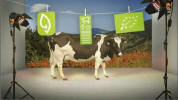 Have you already chosen the best outfit for the EU trendy organic cow ?
Have you already chosen the best outfit for the EU trendy organic cow ?
Do it now and check what she exactly calls for : http://www.youtube.com/watch?v=fqQuReet-Ho
 Organic food meets fresh design : The European Commission’s Directorate – General for Agriculture and Rural Development is inviting all design and art students from the 27 EU Member States to enter the EU – wide organic logo competition. The competition offers a prize that money just can’t buy : The winning logo will be introduced as the official logo for organic products throughout the European Union in July 2010. On the eve of the organic logo competition launch, Mariann Fischer Boel, European Commissioner for Agriculture and Rural Development, said : ‘The new organic logo will bring identity to the organic sector in the EU. It will help in creating the single market, and that’s good news for producers and consumers.’
Organic food meets fresh design : The European Commission’s Directorate – General for Agriculture and Rural Development is inviting all design and art students from the 27 EU Member States to enter the EU – wide organic logo competition. The competition offers a prize that money just can’t buy : The winning logo will be introduced as the official logo for organic products throughout the European Union in July 2010. On the eve of the organic logo competition launch, Mariann Fischer Boel, European Commissioner for Agriculture and Rural Development, said : ‘The new organic logo will bring identity to the organic sector in the EU. It will help in creating the single market, and that’s good news for producers and consumers.’
If you still haven’t voted for the new EU organic logo, don’t miss the chance !
Which one should be the new EU organic logo ?
Help Europe to decide by directly clicking on your favourite logo !
From July 2010 onwards, one of those logos will be displayed on all organic products in Europe. Which logo deserves the honour to be printed onto million of organic food packages ?
3422 logo submissions, only 3 finalists.
The designers from all over Europe have done their bit. Now it’s your turn !
Have your say, visit : http://ec.europa.eu/agriculture/organic/logo/voting/voting_en.htm
Polish version : http://ec.europa.eu/agriculture/organic/logo/voting/voting_pl.htm
Action is needed to improve communication about the qualities of agricultural products — to help reconnect farmers with consumers. Quality labelling schemes must also be easier for people to use and understand and EU policy must be more coherent. These are the main recommendations of a European Commission Communication on agricultural product quality policy, adopted today. EU farmers meet some of the most stringent farming requirements in the world regarding environmental protection, animal welfare and the use of pesticides and veterinary drugs. In addition, they use their expertise and skill to give their products individual qualities that add value. But do farmers get a fair return for their efforts? Do consumers get accurate information about product characteristics and farming attributes ? 'The EU’s agri – food sector has a well – deserved reputation for high quality thanks to decades, even centuries, of commitment to excellence,’ said Mariann Fischer Boel, Commissioner for Agriculture and Rural Development. 'Our farmers have to build on this reputation to sustain their competitiveness. They need to communicate better with consumers about the qualities of their products. The EU is willing to help in this effort. We have a golden opportunity to bring more coherence and simplicity to our various labelling and certification schemes.’
In the Communication the Commission proposes in particular to :
– Extend labelling that identifies the place where agricultural product was farmed,
– Examine the feasibility of laying down specific optional reserved terms for 'product of mountain farming’ and 'traditional product’. The latter could replace the current 'traditional specialities guaranteed’ scheme,
– Create a unique register for all geographical indications (for wines, spirits and agricultural products and foodstuffs) while preserving the specificities of each system,
– Improve the single market for products under labelling schemes, particularly for organic products,
– Improve international protection of geographical indications and contribute to the development of international standards for marketing standards and organic product,
– Develop 'good practice’ guidelines for private certification schemes to reduce potential for consumer confusion and to reduce red-tape for farmers.
